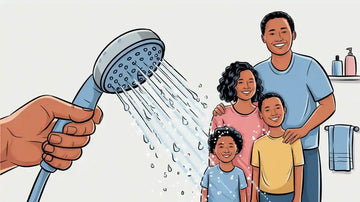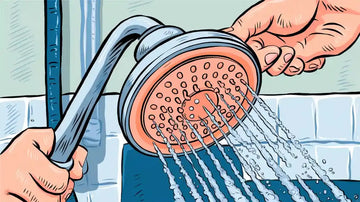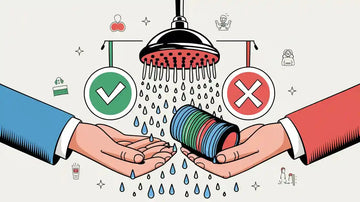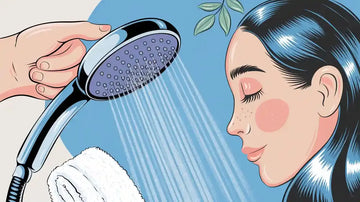A filter shower head gives you cleaner water when you shower. This shower filter takes out chlorine, heavy metals, and other bad things from your water. Many people worry about chlorine, lead, and mercury in their shower water. These things can dry out your skin and hair or make them feel itchy. Shower head filters help make your water better. This helps you have healthier skin and softer hair every day.
Key Takeaways
Filter shower heads make your water cleaner. They take out chlorine, heavy metals, and other bad things. This helps protect your skin and hair.
These shower heads use special materials to clean water. Some of these are KDF-55, calcium sulfite, and activated carbon. These help keep water soft and safe.
Good filter shower heads do not lower water pressure. They also give you different spray choices. This makes showers feel better.
You should change the filter cartridge every 3 to 6 months. This helps the filter work well and keeps your water clean.
Pick a filter that cleans water well. It should be easy to put in and keep up. It should also have good water pressure.
What Is a Filter Shower Head?
Basic Definition
A filter shower head is a kind of shower filter. It cleans water before it touches your skin or hair. You put it on your shower like any other shower head. Inside, there is a water filtration system. This system takes out chlorine, heavy metals, and other bad things. The filters use things like KDF-55, calcium sulfite, activated carbon, and mineral balls. Each one helps remove different things from the water. KDF-55 helps get rid of chlorine and can lower lead and mercury. Calcium sulfite works fast to take out chlorine, even in hot water. Activated carbon soaks up chemicals and smells. Mineral balls can make water softer and add good minerals.
Note: Experts say a filter shower head uses a built-in filtration system. It lowers chlorine and heavy metals in your water. This makes your shower water safer and better for your skin and hair.
You need to change the filter cartridge every few months. This keeps your shower filter working well. Most filters are easy to change. You do not need special tools or skills.
Here is a simple table that shows how a filter shower head is different from a regular shower head:
Feature |
Filtered Shower Heads |
Standard Shower Heads |
|---|---|---|
Filtration Media |
Multi-stage filters use KDF-55, calcium sulfite, activated carbon, mineral balls to remove chlorine, heavy metals, sediment, bacteria, microplastics |
None; no filtration media |
Water Flow Rate |
Keeps strong flow (about 1.5 to 2.5 GPM), some save water at about 1.8 GPM with no pressure loss |
Focus on water delivery, no filtration impact |
Often have many spray modes like rain, massage, and mist |
Usually have fewer or just one spray mode |
|
Water Quality Benefits |
Makes water softer and cleaner; lowers chlorine vapors and mineral buildup; helps skin and hair health |
No water quality improvement |
Filter Cartridge |
Filters last 3 to 6 months; need cleaning and replacement every month |
No filters, no maintenance |
Pressure Impact |
Some may lower pressure because of filter media and spray holes; good models keep steady pressure and even spray |
No pressure impact from filtration |
Installation |
Easy to install, no tools needed; fits most showers |
Standard installation, no extra parts |
Main Purpose
The main reason for a filter shower head is to keep you safe from bad things in your shower water. Cities add chlorine to water to kill germs. But chlorine can dry your skin and hurt your hair. Heavy metals like lead and mercury can get in water from old pipes or pollution. These things can make your skin dry or itchy and may cause health problems.
Doctors and water experts say shower filters help lower chlorine and heavy metals. Using a filter shower head means less risk of dry skin, irritation, and hair damage. The filter works by letting water pass through special materials. These materials trap or change the bad stuff. KDF-55 changes chlorine into a safe form and lowers heavy metals. Calcium sulfite removes chlorine fast, even in hot water. This makes your shower water softer and safer.
Studies show that shower head filters with KDF-55 and calcium sulfite can take out most chlorine and lower heavy metals. These filters do not get rid of all bacteria, but they make water much cleaner. NSF certification for KDF-55 proves it can remove chlorine. Korean hospital studies show people have better hygiene and less skin irritation with shower filters.
You get many good things from using a filter shower head:
Softer and cleaner water for your shower
Less chlorine and fewer heavy metals on your skin and hair
Better skin and hair over time
Easy to install and take care of
A filter shower head is an easy way to make your water better at home. You do not need to change your whole plumbing. Just put on the shower filter and enjoy better showers every day.
How Shower Filters Work
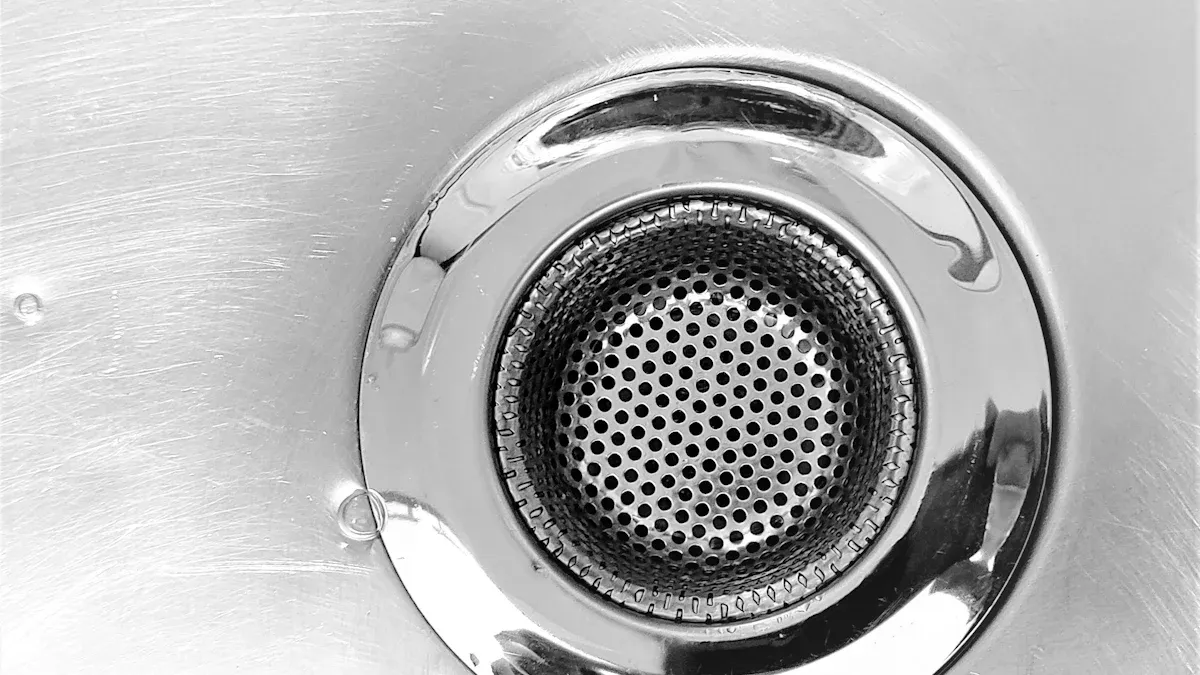
Filtration Process
A shower filter helps make your water cleaner before it touches you. Water goes through many layers inside the filter. Each layer does something special. The first layer catches big things like rust, sand, and dirt. This makes your water look clearer right away.
Then, water goes to the next layer. This part takes out a lot of chlorine. Chlorine can dry your skin and hair. It can also make your shower smell bad. After that, water moves to a layer for heavy metals. These metals, like lead and mercury, can come from old pipes or pollution. The filter stops these metals from getting to you.
Some shower filters, like the Cobbe DS Filter Shower Head, have 20 layers. These layers use over half KDF-55, calcium sulfite balls, and mineral balls. They work together to take out almost all chlorine and heavy metals. The Cobbe DS keeps your water pressure strong, even if your house has low pressure. You can pick from five spray modes and still get clean water.
Here is a simple list of the main steps in a shower filter:
Sediment filtration: Takes out rust, sand, and big pieces.
Chlorine removal: Lowers chlorine and its bad smell.
Heavy metal removal: Stops lead, mercury, and other metals.
KDF-55 layer: Cuts down bacteria, heavy metals, and chlorine.
Activated carbon: Soaks up chlorine, chemicals, and smells.
Extra stages: Some filters add vitamin C or mineral balls for softer water and better skin.
Tip: Multi-stage shower filters protect you from many bad things. You get cleaner water and your skin and hair stay healthier.
Filter Media Types
The filter media inside your shower filter decides what gets taken out. Each type works in its own way. Some focus on chlorine, while others help with heavy metals or make water better.
Here is a table that shows what each filter media does:
Filter Media |
Contaminants Removed |
Effectiveness & Notes |
|---|---|---|
KDF-55 |
Chlorine (up to 95%), heavy metals (lead, mercury, iron), hydrogen sulfide |
Works well in hot water; stops bacteria growth; lasts long; removes many contaminants |
Activated Carbon |
Chlorine, VOCs, odors |
Absorbs chemicals; less effective in hot water; best as a support layer |
Vitamin C |
Chlorine and chloramine (up to 99%) |
Removes chlorine by chemical reaction; gentle on skin; short lifespan; does not remove heavy metals |
Calcium Sulfite |
Free chlorine |
Fast reaction, even in hot water; limited effect on other contaminants; needs replacement |
You will often see KDF-55 in good shower filters. KDF-55 uses copper and zinc to change chlorine into safe chloride ions. It also traps heavy metals like lead and mercury. This type works well in hot water, which is great for showers. Activated carbon helps by soaking up chlorine, bad smells, and chemicals. It does not work as well in hot water, but it still helps make water better.
Vitamin C filters take out almost all chlorine and chloramine. They are gentle on your skin and hair. But they do not take out heavy metals and need to be changed more often. Calcium sulfite reacts fast with chlorine, even in hot water. It does not take out heavy metals but is good for quick chlorine removal.
Most advanced shower filters, like the Cobbe DS Filter Shower Head, use more than one type of media. You get the good parts of each one. The Cobbe DS is special because it uses a lot of KDF-55, calcium sulfite, and mineral balls in its 20 layers. This means you get strong chlorine removal, protection from heavy metals, and softer water every day.
Note: Multi-stage filters work best. They keep you safe from chlorine, heavy metals, and other bad things. You get safer water and better skin and hair with every shower.
Filter Shower Head Benefits

Water Quality Improvement
Using a shower filter can make your water better at home. Many people want to get rid of chlorine and heavy metals in their shower water. Some filters, like the Cobbe DS Filter Shower Head, use new technology to remove these things. After you put in a shower filter, your water may smell nicer and feel softer.
But not all filters work the same way. Some studies say many shower filters do not always do what they promise. Sometimes, filters can even add more metals like zinc or lead to the water. This happens because of what is inside the filter. Look at this chart to see how some bad things changed after using a filter:
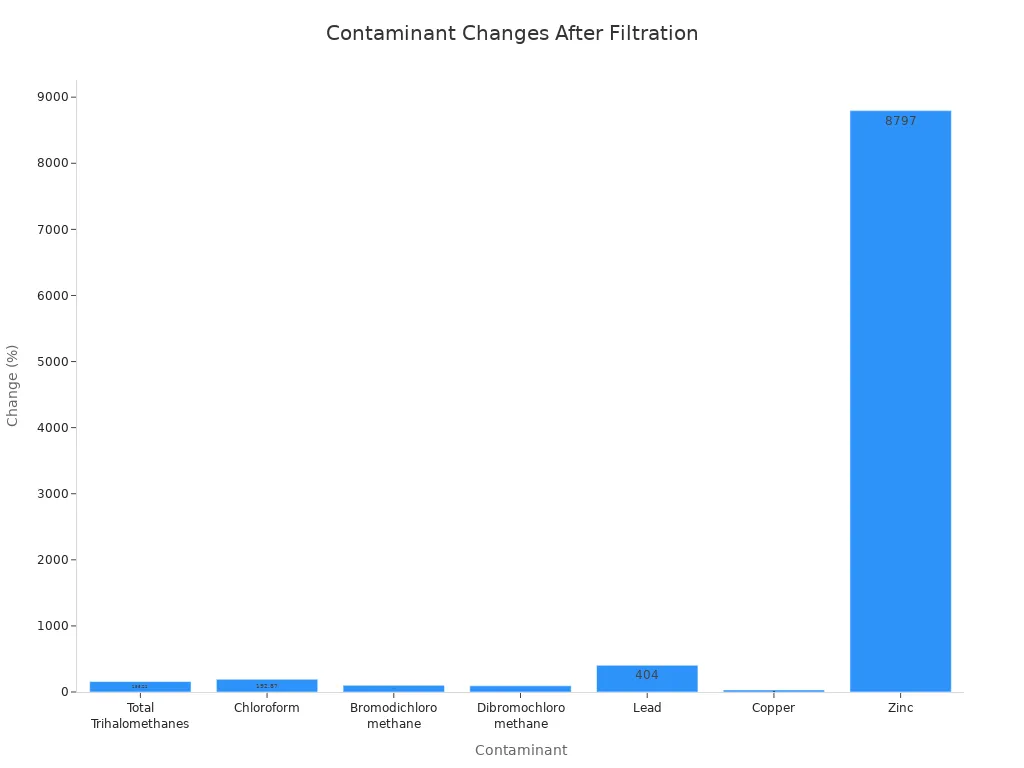
You should always check your filter’s quality and change it on time. Good shower filters can help take out chlorine and make water feel cleaner, but results are not always the same. Always pick filters that make water better without causing new problems.
Skin and Hair Health
Filtered water can really help your skin and hair. Hard water and chlorine can make your skin dry and itchy. They can also make skin problems like eczema worse. Skin doctors say taking out chlorine and heavy metals helps your skin stay soft and less itchy. Your hair can look shinier and be easier to brush.
Many people say their skin feels less dry and their hair looks better after using a shower filter. You might see fewer pimples, less redness, and smoother skin. Hair can be less frizzy and fall out less. This happens because filtered water keeps your skin and hair’s natural oils. Harsh chemicals do not wash them away.
Tip: If your skin or scalp is sensitive, a shower filter can help stop itching and make you feel better.
Water Pressure
You might think a filter will make your shower weaker. Some filters do slow down the water, but good ones like the Cobbe DS Filter Shower Head keep the pressure strong. This shower filter has a special design to keep water flowing well, even while cleaning out chlorine and metals.
You can use different spray modes and still have strong water. This means you get clean water and a powerful shower at the same time. Good water pressure helps you rinse off soap and shampoo fast. This makes your shower feel nice every time.
Choosing a Shower Head Filter
Types of Shower Head Filters
There are many kinds of shower filters you can buy. Each one cleans water in its own way. Some filters work best for chlorine. Others help with heavy metals or add minerals to your water. The table below shows how the main types are different:
Filter Type |
Filtration Mechanism |
Claims and Effectiveness |
|---|---|---|
Carbon Block |
Adsorption via porous activated carbon |
Removes chlorine and some chemicals; not for hard water. |
KDF |
Redox reaction converting contaminants |
Reduces chlorine and heavy metals; works in hot water. |
Vitamin C |
Chemical reaction neutralizing chlorine |
Removes chlorine and chloramine; not for metals. |
Zeolite |
Ion exchange and physical adsorption |
Removes some metals and ammonia; not for chlorine. |
Tourmaline |
Electrical charge generation (claimed) |
Claims softening; little scientific proof. |
Maifan Stone |
Mineral release and adsorption |
Adds minerals; not for chlorine or metals. |
Calcium Sulphite |
Chemical reaction converting chlorine |
Removes chlorine fast; not for metals. |
FIR Ceramic Balls |
Far-infrared radiation (claimed) |
Limited proof; may add trace minerals. |
Most filters do a good job with chlorine. If you want less heavy metals, pick KDF or zeolite. For softer water, try tourmaline or maifan stone, but results are not always the same.
Key Features
When picking a shower filter, look for features you need. Here are the most important things to think about:
Water Pressure: Make sure your shower stays strong. Some filters, like the Cobbe DS Filter Shower Head, work well even with low pressure.
Spray Patterns: More spray modes, like rain or massage, make showers fun.
Filtration: Choose a filter that takes out chlorine and heavy metals. KDF-55 and calcium sulfite are good options.
Water Efficiency: Pick models that save water and have flow restrictors.
Easy Maintenance: Get a filter with simple cartridge changes and easy cleaning.
Style and Finish: Match your bathroom with finishes like chrome or matte black.
Compatibility: Most filters fit standard showers, but always check before you buy.
Tip: More filtration stages does not always mean better water. Focus on the type and amount of media, not just the number of stages.
Installation and Maintenance
Most shower filters are easy to put in. The Cobbe DS Filter Shower Head needs no tools and fits most showers. You can set it up in just a few minutes. The filter cartridge lasts for months and is easy to change.
Taking care of your filter is simple. Clean the spray holes if they get blocked. Change the filter on time to keep water clean. The Cobbe DS is strong and does not cost much, with replacements costing less than eight cents a day.
Some people want more than just a shower filter. Whole-house water softeners clean all the water in your home, but they cost a lot more. Look at the chart below to see how prices compare:
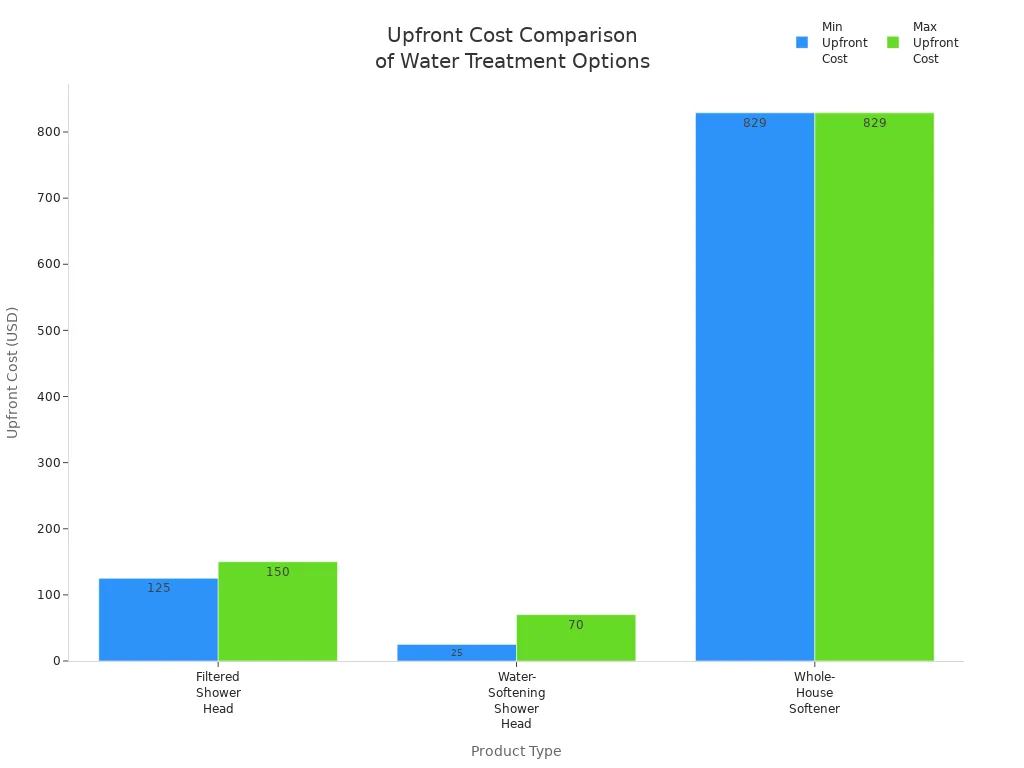
Water-softening shower heads are cheap and easy to install. Whole-house systems cost more but treat all your water. For most people, a shower filter is an easy way to get better water and protect your skin and hair.
Picking a filter shower head gives you lots of good things. Your water gets cleaner. Your skin feels softer. Your hair gets healthier. The table below shows the main benefits:
Benefit |
What You Gain |
|---|---|
Water Quality |
Removes chlorine and heavy metals |
Skin and Hair Health |
Less dryness, smoother hair |
Easy Installation |
Quick setup, simple maintenance |
Strong Water Pressure |
Enjoy a powerful shower every day |
You help your health by taking out bad stuff from your water. Doctors say cleaner water makes you feel better and more refreshed. If you want an easy change, try a Cobbe DS Filter Shower Head. You will get a nicer shower and help your health.
FAQ
How often should you change the filter in a shower head?
You should change the filter every 3 to 6 months. If your water has more chlorine or heavy metals, change it sooner. Always check the manufacturer's guide for the best results.
Can a filter shower head help with hard water?
A filter shower head can reduce some minerals and soften water a little. For very hard water, you may need a water softener. You will still notice less buildup and softer skin.
Will a filter shower head lower your water pressure?
Good filter shower heads, like the Cobbe DS, keep strong water pressure. You can enjoy clean water and a powerful shower at the same time. Poor-quality filters may slow the flow.
Do filter shower heads fit all showers?
Most filter shower heads fit standard shower arms. You can install them without tools. Always check the size before you buy. If you have a special shower setup, look for a compatible model.


